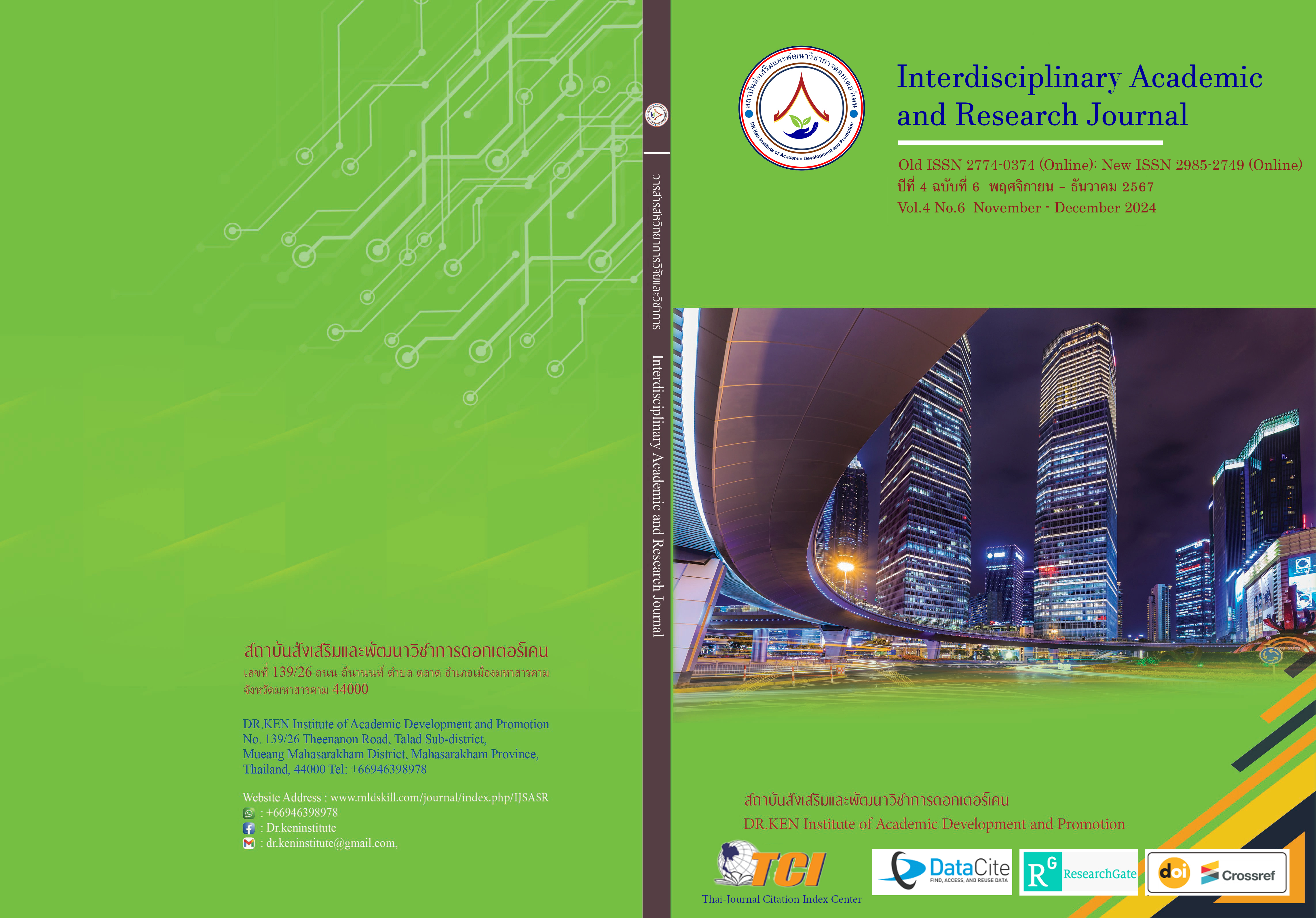Program to Enhance Digital Technology Skills of School Administrators in the 21st Century under the Secondary Educational Service Area Office Maha Sarakham
DOI:
https://doi.org/10.60027/iarj.2024.279082Keywords:
Program; , Digital Technology Skills;, Assessment; , Educational institution AdministratorsAbstract
Background and Aims: Organizations and citizens of the world are impacted by the rapidly evolving scientific and digital technologies of the twenty-first century in a variety of ways. Propulsion's present approach to managing educational quality focuses on helping students acquire the digital learning skills necessary to succeed in the twenty-first century, when school administrators are viewed as crucial leaders. Developing new competencies, skills, knowledge, and abilities is essential. Under the auspices of the Secondary Educational Service Area Office Maha Sarakham, this study intends to investigate the following: (1) the present state, the ideal state, and the essential needs of digital technology skills for educational institution administrators in the twenty-first century. (2) Under the auspices of the Secondary Educational Service Area Office Maha Sarakham, develop and assess a program aimed at raising the 21st-century digital technology proficiency of school administrators.
Methodology: The research is a mixed-methodology and divided into 2 phases: Phase 1: Analysis of the situation as it stands ideal state and required necessities. Under the supervision of the Secondary Educational Service Area Office Maha Sarakham, 320 educators and administrators made up the sample group. A rating scale-based questionnaire served as the research tool. Phase 2: Develop and assess a program for enhancing digital technology skills. Teachers, educational personnel, and administrators of schools make up the group of informants comprising nine individuals in total who served as experts and information sources. Examine the program's suitability and practicability for six individuals by making a specific selection. An interview form and an assessment form for the program's suitability and feasibility are among the research instruments utilized. The statistics of frequency, percentage, mean, and standard deviation are employed in data analysis.
Results: The results of the research found that: (1) the current state of digital technology skills of school administrators in the 21st century is overall at a high level in every aspect. The overall desired state of digital technology skills of school administrators in the 21st century is at the highest level in every aspect. And the importance of the necessary need to strengthen the digital technology skills of school administrators in the 21st century under the Secondary Educational Service Area Office Maha Sarakham. Arrange the importance of needs Essentials from most to least include having a vision for digital technology. Communication and ethics in digital technology and knowing and using digital technology, respectively. (2) Program to enhance digital technology skills of school administrators in the 21st century under the Secondary Educational Service Area Office Maha Sarakham, consisting of 1) principles, 2) objectives, 3) Content is divided into 3 modules: Module 1: Having a vision in digital technology. Module 2: Knowing and using digital technology. Module 3: Communication and ethics in digital technology. 4) 70-20-10 development method. The development method consists of Workshop actual operations and self-study. 5) Evaluation of participants receiving development.
Conclusion: The results of the evaluation of the suitability and feasibility of the program to enhance digital technology skills of school administrators in the 21st century under the Secondary Educational Service Area Office Maha Sarakham found that it was at the highest level of suitability and feasibility.
References
กัลยวรรธน์ ตะเภาทอง, สถิรพร เชาวน์ชัย และ วิทยา จันทร์ศิลา. (2565). แนวทางการพัฒนาภาวะผู้นำเชิงเทคโนโลยีของผู้บริหารโรงเรียนขยายโอกาสสังกัดสำนักงานเขตพื้นที่การศึกษาประถมศึกษาพิจิตร เขต 1. Journal of Modern Learning Development, 7(2), 41-55.
ชาณัตถ์ รุ่งรัตน์. (2558). แนวทางการนำเทคโนโลยีสารสนเทศเพื่อการบริหารสถานศึกษา อำเภอไพศาลีสังกัดสำนักงานเขตพื้นที่การศึกษาประถมศึกษานครสวรรค์ เขต 3. ปริญญานิพนธ์การศึกษามหาบัณฑิต สาขาวิชาการบริหารการศึกษา มหาวิทยาลัยราชนครสวรรค์.
ดาวรุวรรณ ถวิลการ. (2564). ภาวะผู้นำดิจิทัล Digital Leadership. ขอนแก่น: มหาวิทยาลัยขอนแก่น.
ทรงศักดิ์ ภูสีอ่อน. (2558). การประยุกต์ใช้ SPSS วิเคราะห์ข้อมูลงานวิจัย. พิมพ์ครั้งที่ 7.มหาสารคาม: ตักสิลาการพิมพ์.
ทองทิพภา วิริยะพันธุ์. (2550). ทักษะผู้บริหาร. กรุงเทพฯ:จี. พี ไซเบอร์พริ้นท์.
ทิพวรรณ ล้วนปสิทธิ์สกุล. (2562). คุณลักษณะผู้บริหารสถานศึกษาขั้นพื้นฐานที่สอดคล้องกับเป้าหมายการศึกษาของนโยบายไทยแลนด์ 4.0. ปริญญานิพนธ์ การศึกษาดุษฎีบัณฑิต สาขาวิชาการบริหารการศึกษา มหาวิทยาลัยศิลปากร.
ธัญณิชา สุขวงค์. (2564). การศึกษาภาวะผู้นำเชิงเทคโนโลยีของผู้บริหารสถานศึกษาในยุคดิจิทัลสังกัดสำนักงานเขตพื้นที่การศึกษามัธยมศึกษา เขต 29. วารสารการบริหารการศึกษาและภาวะผู้นำมหาวิทยาลัยราชภัฏสกลนคร, 9(34), 32-42.
ธํารง บัวศรี. (2542). ทฤษฎีหลักสูตร: การออกแบบและการพัฒนา. พิมพ์ครั้งที่ 2. กรุงเทพฯ: ธนชัชการพิมพ์.
นิศาชล บำรุงภักดี. (2563). ความสัมพันธ์ระหว่างภาวะผู้นำทางเทคโนโลยีสารสนเทศของผู้บริหารสถานศึกษากับประสิทธิผลโรงเรียน ในสังกัดองค์กรปกครองส่วนท้องถิ่นจังหวัดสกลนคร. วิทยานิพนธ์ศึกษาศาสตรมหาบัณฑิต สาขาวิชาการบริหารการศึกษา มหาวิทยาลัยราชภัฏสกลนคร.
บุญชม ศรีสะอาด. (2553). การวิจัยเบื้องต้น. พิมพ์ครั้งที่ 8. กรุงเทพฯ: สุวีริยาสาส์น.
บุญชม ศรีสะอาด. (2556). การวิจัยเบื้องต้น. พิมพ์ครั้งที่ 9. กรุงเทพฯ: สุวีริยาสาส์น.
บุญชม ศรีสะอาด. (2560). การวิจัยเบื้องต้น. พิมพ์ครั้งที่ 10. กรุงเทพฯ: สุวีริยาสาส์น.
ไพศาล วรคำ. (2564). การวิจัยทางการศึกษา. กรุงเทพฯ: ศูนย์หนังสือจุฬาลงกรณ์มหาวิทยาลัย.
วรรณนภา จำเนียรพืช. (2564). ภาวะผู้นาทางเทคโนโลยีของผู้บริหารสถานศึกษาที่ส่งผลต่อทักษะครูใน ศตวรรษที่ 21 ของสถานศึกษา สังกัดสำนักงานเขตพื้นที่การศึกษามัธยมศึกษาพระนครศรีอยุธยา. วิทยานิพนธ์ ครุศาสตรมหาบัณฑิต สาขาวิชาการบริหารการศึกษา มหาวิทยาลัยราชภัฏพระนครศรีอยุธยา.
วสันต์ชัย สดคมขำ. (2563). ภาวะผู้นำเชิงเทคโนโลยีของผู้บริหารสถานศึกษาที่ส่งผลต่อการบูรณาการเทคโนโลยีและเจตคติต่อการใช้เทคโนโลยีของครูในสถานศึกษา สังกัดสำนักงานเขตพื้นที่การศึกษาประถมศึกษาสุพรรณบุรี เขต 1. การศึกษามหาบัณฑิต สาขาวิชาการบริหารการศึกษา คณะศึกษาศาสตร์ มหาวิทยาลัยศรีนครินทรวิโรฒ.
สำนักงานเขตพื้นที่การศึกษามัธยมศึกษามหาสารคาม. (2566). แผนปฏิบัติการประจำปีงบประมาณ 2566. Retrieved on 18 April 2021 from: https://www.ses26.go.th/?page_id=22319
สำนักงานคณะกรรมการดิจิทัลเพื่อเศรษฐกิจและสังคมแห่งชาติ. (2560). หลักสูตรการเข้าใจดิจิทัล. กระทรวงดิจิทัลเพื่อเศรษฐกิจและสังคม. Retrieved on 18 April 2021 from: http://www.dlthailand.org/dl-curriculum/curriculum/
สำนักงานเลขาธิการสภาการศึกษา. (2560). แผนการศึกษาแห่งชาติพ.ศ. 2560–2574. กรุงเทพฯ: กระทรวงศึกษาธิการ.
สุกัญญา แช่มช้อย. (2560). การบริหารสถานศึกษาในยุคดิจิทัล. พิษณุโลก: สำนักพิมพ์มหาวิทยาลัยนเรศวร.
สุกัญญา แช่มช้อย. (2562). การบริหารสถานศึกษาในยุคดิจิทัล. ครั้งที่ 2. กรุงเทพฯ: สำนักพิมพ์จุฬาลงกรณ์มหาวิทยาลัย.
สุภัททรา สังขวร. (2560). ความสัมพันธ์ระหว่างคุณลักษณะผู้นำเชิงเทคโนโลยีกับการบริหารงานวิชาการของผู้บริหารสถานศึกษา สังกัดสำนักงานเขตพื้นที่การศึกษาประถมศึกษาลพบุรี เขต 2. วิทยานิพนธ์ศึกษาศาสตรมหาบัณฑิต สาขาวิชาการบริหารการศึกษา มหาวิทยาลัยเทคโนโลยีราชมงคลธัญบุรี.
Boone, M. (1992). The Impact of Leadership Behavior of the Superintendent on Restructuring Rural Schools. Texas: Abstracts from ERIC database: ERIC NO: 354115.
Caffarella, R. (2002). Planning Program for Adult Learner: a Practice Guide for Educators, Trainer and Staff Developer. San Francisco: Jossey-Bass.
Kanaya, T., & McMillan, K. (2005). Factors Influencing Outcomes from a Technology-Focused Professional Development Program. Journal of Research on Technology in Education, 37(2), 313-329.
Knowles M.S. (1980). The Modern Practice of Adult Education: From Pedagogy to Andragogy. New York: Cambridge. The Adult Education Company.
Krejcie, R.V., & Morgan, D.W. (1970). Determining sample size for research activities. Educational and Psychological Measurement. 30(3), 607–610.
Niedermeyer, F.C. (1992). A Checklist for Reviewing Environmental Education Programs. Journal of Environmental Education, 23(2), 46-50.
Downloads
Published
How to Cite
Issue
Section
License
Copyright (c) 2024 Interdisciplinary Academic and Research Journal

This work is licensed under a Creative Commons Attribution-NonCommercial-NoDerivatives 4.0 International License.
Copyright on any article in the Interdisciplinary Academic and Research Journal is retained by the author(s) under the under the Creative Commons Attribution-NonCommercial-NoDerivatives 4.0 International License. Permission to use text, content, images, etc. of publication. Any user to read, download, copy, distribute, print, search, or link to the full texts of articles, crawl them for indexing, pass them as data to software, or use them for any other lawful purpose. But do not use it for commercial use or with the intent to benefit any business.
















.png)


